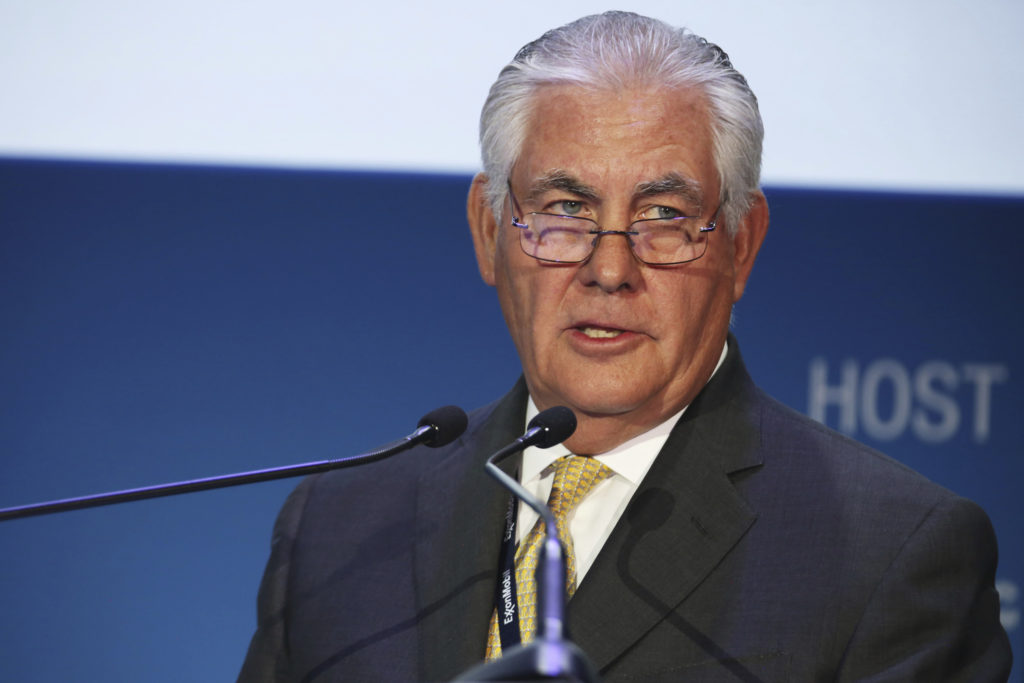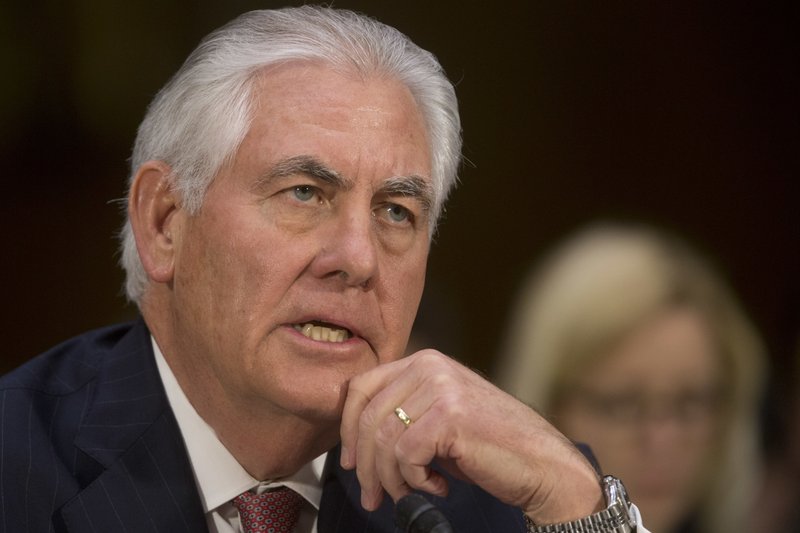Rex Tillerson calls for balancing US security interests, values

Translating “America First” into diplomatic policy, Secretary of State Rex Tillerson has proclaimed that the United States can’t always afford to condition its foreign relationships and national security imperatives on countries adopting American values like human rights. Appearing before State Department employees anxious about changing priorities, Tillerson on Wednesday steered clear of giving details about the 2,300 jobs he plans to eliminate or how his proposed cut of roughly a quarter of the department’s budget will affect agency operations and programs. But he acknowledged widespread unease about the forthcoming changes and pledged that diplomats would emerge from the department’s changes with “a much more satisfying, fulfilling career.” Yet even as he left key administrative questions unanswered, Tillerson offered the most extensive elaboration to date of the meaning of President Donald Trump‘s “America First” mantra, adopted during the presidential campaign and taken to the White House. Over the last two decades, he said, Washington had “lost track” of whether post-Cold War alliances were still serving U.S. interests. The former Exxon Mobil CEO distinguished between U.S. “values,” which he described as enduring, and “policies,” which Tillerson said must adapt to the times. “In some circumstances, if you condition our national security efforts on someone adopting our values, we probably can’t achieve our national security goals,” Tillerson said. “It really creates obstacles to our ability to advance our national security interests, our economic interests.” Still, he insisted the U.S. won’t abandon core values. In some instances, Tillerson said, the U.S. should and will require other nations to adopt “certain actions as to how they treat people” if they want to cooperate with the U.S. In other instances, he said the U.S. would continue advocating for its values without using them as leverage. “It doesn’t mean that we leave those values on the sidelines,” Tillerson said. “It doesn’t mean that we don’t advocate for and aspire to freedom, human dignity, and the treatment of people the world over.” Rights groups and lawmakers from both parties have raised concerns about the administration de-emphasizing human rights, pointing to Trump’s warm interactions with leaders of nations like the Philippines and Egypt, which have experienced democratic backsliding in recent years. Tillerson’s remarks reinforced the notion that under Trump, the U.S. is willing to cut deals and cooperate closely with governments failing to improve their rights records. Speaking without notes while pacing onstage, Tillerson took diplomats on a rhetorical tour of global hotspots, laying out the various elements of his diplomatic efforts to date: —On Russia, Tillerson said “there’s almost no trust” between the world’s greatest nuclear powers, but that the administration was trying to rebuild trust by looking at one issue at a time. First up is Syria, as Washington and Moscow see if they can get a cease-fire that can hold. —On America’s two closest neighbors, he said Mexico and Canada are “ready to engage in a good-faith effort” to update their trade relationships with America, alluding to Trump’s insistence that the North America Free Trade Agreement be renegotiated or canceled. He said ties with both aren’t “as rocky as it looks sometimes.” —In Asia, he said the U.S. has prepared new sanctions on North Korea. He said the U.S. will take action against countries failing to fully implement existing United Nations penalties on doing business with Pyongyang. He said the administration is taking a new look at relations with China and next month would hold the first session of a diplomatic and security dialogue with senior Chinese officials. Tillerson’s address came as he prepares a massive reorganization and downsizing that has fueled Democratic and Republican fears that the administration is downgrading the importance of aid and diplomacy. Even as Tillerson proposes a 26 percent cut to the budget, Trump is pressing for a major funding boost to the Pentagon and has already secured billions of dollars in new military funding from Congress. Tillerson said there was “nothing easy” about what he is trying to do, conceding that the overhaul would present major disruptions for diplomats and their families who serve in posts worldwide. He asked employees to provide input — through a survey and other methods — to help shape the agency’s future direction. The State Department employs about 75,000 people globally. “I can promise you that when this is all done, you’re going to have a much more satisfying, fulfilling career,” Tillerson said. “Because you’re going to feel better about what you’re doing.” Republished with permission of The Associated Press.
What exactly is US Syria policy? Big questions for allies

Seeking support from abroad, the U.S. struggled Monday to explain a hazy Syria strategy that has yet to clarify key questions: whether President Bashar Assad must go, how displaced Syrians will be protected and when America might feel compelled to take further action. Successive attempts by top Trump administration officials to articulate a plan have only furthered the appearance of a policy still evolving, even after the U.S. broke with precedent last week by attacking Assad’s forces. In the absence of answers, other countries seem to be moving ahead on their own terms. British Foreign Secretary Boris Johnson, after a meeting in Italy with U.S. Secretary of State Rex Tillerson, floated the possibility of new sanctions on both the Syrian and Russian militaries, an idea the U.S. has only briefly mentioned. In an unusual announcement for a foreign government, Johnson also said the U.S. could launch more cruise missiles into Syria like the ones President Donald Trump ordered last week in reaction to Assad’s use of chemical weapons. “Crucially, they could do so again,” Johnson said. Tillerson himself raised fresh expectations for aggressive U.S. action — and not only in Syria — as he visited Sant’Anna di Stazzema, a Tuscan village where the Nazis massacred more than 500 civilians during World War II. As he laid a wreath, he alluded to the Syria chemical attack. “We rededicate ourselves to holding to account any and all who commit crimes against the innocents anywhere in the world,” Tillerson said. Though such comments hint at a more activist U.S. foreign policy focused on preventing humanitarian atrocities, Trump has consistently suggested he prefers the opposite approach. His young administration has generally downplayed human rights concerns while promoting an “America First” strategy de-emphasizing the concerns of foreign nations. The uncertain view of U.S. objectives prevailed as Tillerson planned to attend a meeting Tuesday of the “likemindeds” — countries that share a similar approach to resolving Syria’s protracted civil war. The session on the sidelines of the Group of 7 summit in Italy was to include Middle East countries, including Turkey, Saudi Arabia, Jordan and the United Arab Emirates, that share a U.S. interest in resolving the conflict and resisting Iran’s influence in Syria. Tuesday night, Tillerson will fly to Moscow, the first official visit by a Trump Cabinet official to Russia, Assad’s strongest ally. The U.S. has said its Syria strategy centers on persuading President Vladimir Putin to stop supporting Assad. On Monday, the U.S. upped the stakes significantly by accusing Russia of knowing in advance of the chemical attack and using a Russian-operated drone to help cover it up. No component of Trump’s Syria policy has engendered more confusion than Assad’s future — an issue that similarly befuddled the Obama administration, whose once-adamant position that Assad must go softened substantially by the time President Barack Obama left office in January. Leading up to the U.S. missile attack, Trump’s administration had said Assad’s future was up to the Syrian people. Then Trump, the day after the assault, said his thinking about Assad had changed. Tillerson answered a question about effecting regime change by saying the U.S. was organizing a coalition to do just that. Yet after Trump’s retaliatory strike, the position became less clear. Some officials, like Tillerson, said the U.S. was confident Syrians would choose on their own to push Assad aside, while suggesting the U.S. wouldn’t mandate it. U.N. Ambassador Nikki Haley and others said ousting Assad was indeed a U.S. goal, but only one of several. Another unanswered question: Did Trump’s strike set a precedent that any chemical attack will trigger a U.S. response? At the White House, spokesman Sean Spicer insisted that Trump wouldn’t box himself in by disclosing his actions in advance. But he added further uncertainty to the equation by saying that even barrel bombs — which Assad has used with frequency — would necessitate U.S. action. “If you gas a baby, if you put a barrel bomb in to innocent people, I think you will see a response from this president,” Spicer said. Minutes later, the White House rushed to clarify that Spicer wasn’t announcing any new policy on barrel bombs. “Nothing has changed in our posture,” a White House official said in a written statement. On one point, the administration has been consistent: Defeating the Islamic State group in Syria is the first priority. There’s less certainty about what comes now. Tillerson and other officials have said the next priority is to create “zones of stability” in Syria where those displaced by civil war can live without fear of violence. They say that entails negotiating cease-fires between Assad’s government and rebels, who have been fighting both IS and Assad. With stability restored, they say, conditions will be ripe for a U.N.-brokered political transition. Yet it’s unclear why rebel groups would agree to cease-fires with Assad, who would protect the zones, and how. Assad’s willingness to clear the way for political talks predicated on him leaving power is deeply in question. Republished with permission of The Associated Press.

